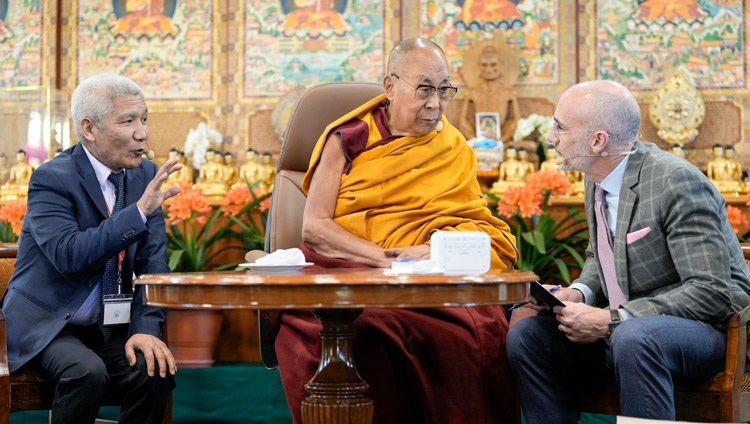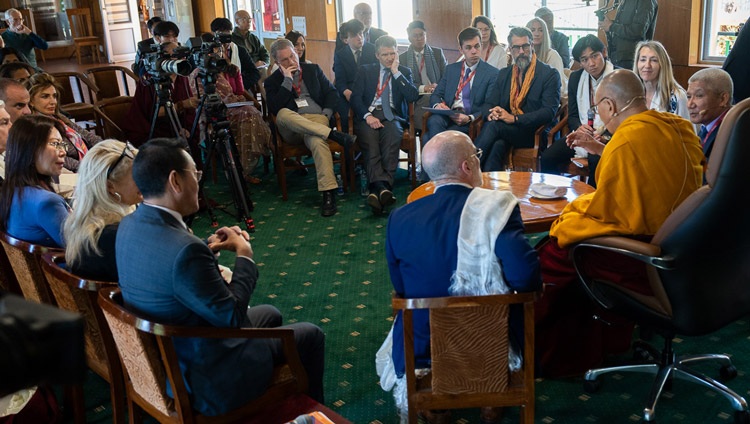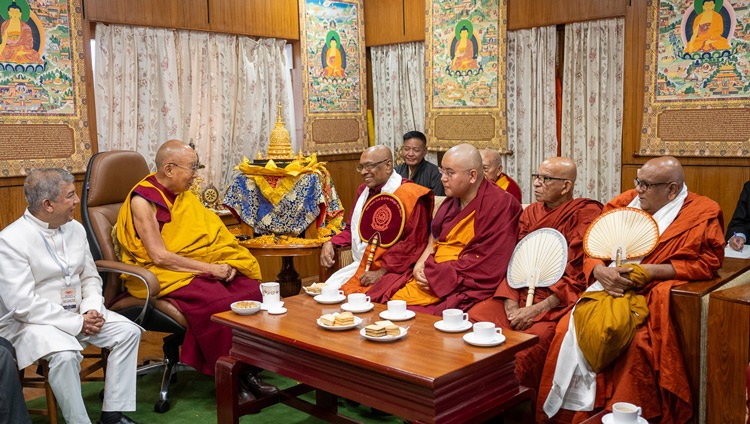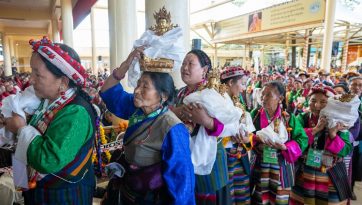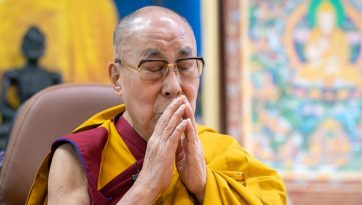Conversation about Happiness, Humor and Compassion
September 22, 2020
Thekchen Chöling, Dharamsala, HP, India – This morning His Holiness the Dalai Lama was joined in conversation via video link by Eugenio Derbez, a Mexican actor, comedian and filmmaker. Derbez wished His Holiness a good morning and told him that words couldn’t express his excitement or the honor he felt to be speaking to him.
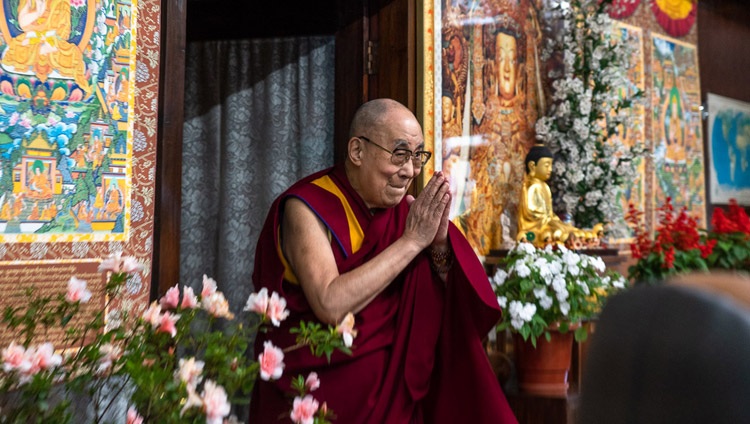
“It’s morning here,” His Holiness replied, “so I’m fresh, but you must be quite sleepy.”
Derbez asked His Holiness to begin by telling him about a day in the life of the Dalai Lama.
“There’s nothing special, I’m just a Buddhist monk who studies Buddhist philosophy. I follow the Vinaya or monastic discipline of the Pali Tradition and in addition, I study according to the Sanskrit tradition. I don’t just rely on faith, but on experiment and investigation.
“In the 8th century, the Tibetan King invited the top scholar of Nalanda University in India to Tibet. By that time China was already a Buddhist country. The Chinese Emperor was interested in Buddhism and there were Chinese monks in Tibet. Nevertheless, the Tibetan King preferred to look to India as the source of the Buddha’s teachings.
“The great masters of Nalanda followed the Buddha’s advice and scrutinized what he had taught concluding that some of his instructions were definitive while others required interpretation. We in Tibet have kept the Nalanda Tradition alive in dependence on reason and logic.
“For the last 40 years or so, I have also engaged in serious discussions with modern scientists, which I feel has been possible because the Nalanda Tradition’s logical approach is compatible with science. We have learned more about the external world and have been able to explain what we know about the mind and emotions. For example, we have five sense consciousnesses, but key to them is our mental consciousness of which our emotions are part.
“As far as our mental consciousness is concerned there are different levels of subtlety between the waking state, the dream state, deep sleep and so on. At the subtlest levels it’s possible to see past lives and sometimes some intimations of the future too. The most subtle consciousness manifests at the time of death. Some practitioners are able to remain absorbed in that state, during which time, despite their being clinically dead, their bodies remain fresh. My tutor, Ling Rinpoché, remained in this state for 13 days and just recently a monk in Taiwan remained absorbed for 26 days.”
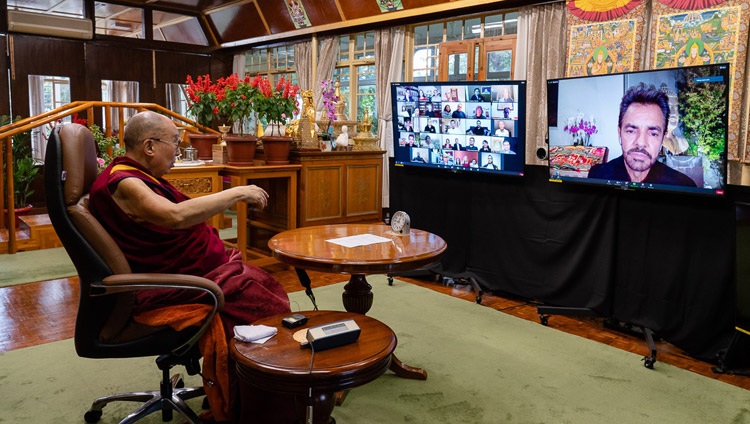
“This is achieved through mediation?” Derbez asked.
“Ÿes, through meditation.”
“And you wake every day at 3am to meditate?”
“Yes,” His Holiness told him, “I do some breathing exercises first, but mostly I engage in analytical meditation. I ask myself ‘Where is the ‘I’?’ ‘Where is my self?’ I have a body, a voice and a mind, but where am ‘I’? And I can’t find it because there is no independent entity to be found; it’s a mere designation.”
Derbez asked, “How can we create a healthy mind? How do we take care of our mental health?”
His Holiness told him that in a materialistically oriented world there isn’t much understanding of the workings of the mind. He suggested that what’s necessary is to recognise the trouble caused by negative emotions and that we can develop antidotes to them. The antidote to fear and anger is compassion. Quantum physics reveals a deeper understanding of reality when it indicates the difference between appearance and reality. This is important because most destructive emotions are based on the appearance that things have some kind of objective existence. Anger, for example, is not rooted in reality, but is an emotional response to the distorted way we view someone or something that has occurred.
A healthy mind is calm and peaceful, His Holiness continued. Ancient Indian literature is rich in instructions for how these qualities may be achieved. He mentioned the positive potential to be gained from combining this understanding of the workings of the mind and emotions with modern education.
Next, Derbez asked, “What is happiness?”
“Happiness can just refer to the pleasure we find on a sensory level,” His Holiness replied. “But real happiness is related to peace of mind. If you have a calm mind, fear and suspicion are reduced. Fear is a major source of unhappiness. Selfishness is a problem because, as scientists observe, we are social animals with a natural concern for the community in which we live.
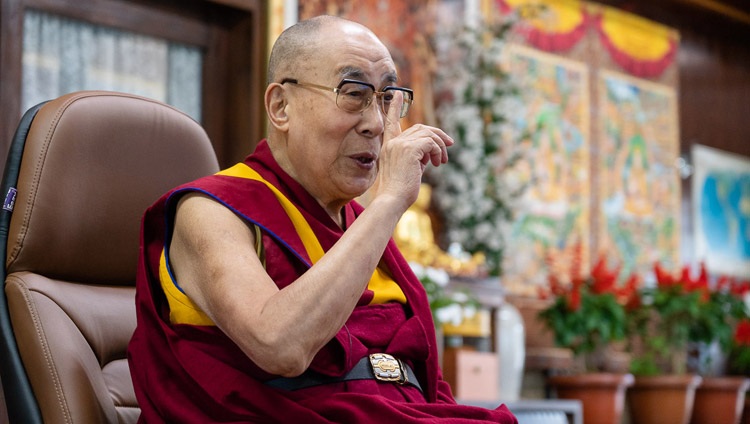
“Children don’t care about superficial differences like nationality, faith or race. But once they go to school they begin to respond to such differences in terms of ‘us’ and ‘them’.
“The reality is that today we are all part of one great human family and we need to have a keener sense of the oneness of humanity. We are all the same in being human. We need to maintain that natural openness we observe in young children.”
Derbez wanted to know what we lose as we grow up and why. His Holiness remarked that simply going to school plays an important role. Where education advances material goals it should also include instruction about our mind and emotions — how to achieve a calm mind, how to develop altruism. An important part of establishing peace of mind, he said, is being able to apply emotional hygiene — that is, learning to tackle destructive emotions.
Laughter and humour were the next topics Derbez raised. His Holiness responded that all human beings are brothers and sisters, each of whom has positive as well as negative potential. Destructive emotions destroy our peace of mind and spoil our relations with our family and friends. Compassion, laughter and a genuine smile, on the other hand, put others at ease and create a happy atmosphere.
“Ultimately it’s having an altruistic attitude that counts. Today, we really need a sense of the oneness of humanity. We have to work together. We need each other. Education is crucial, but isn’t very helpful if it’s too narrow. From ancient India we can learn about the longstanding practices of non-violence and compassion.”
When Derbez asked His Holiness if there are lessons people can learn from their experience of the pandemic, he told him he didn’t know and that he felt it’s difficult to say. He speculated whether one factor in the effects of this particular illness is the amount of toxic chemicals there are today in the air, the water, and in our food.
Derbez enquired whether His Holiness is a vegetarian and he told him he isn’t. He narrated the story of his decision years ago to become a strict vegetarian which resulted in gall bladder problems and his becoming jaundiced. As a result, his physicians recommended that he resume eating some meat. He pointed out that these days the common kitchens of the large monasteries and schools within the Tibetan exiled community generally serve vegetarian food.
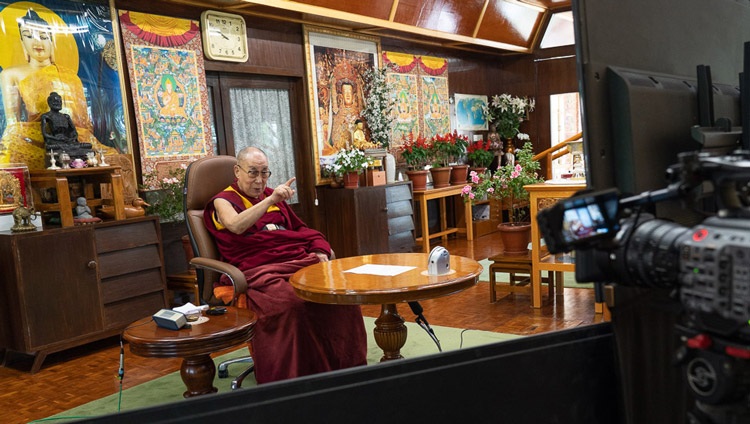
Observing that His Holiness is a loving human being and as Dalai Lama he is a symbol of love, Derbez wondered if he was ever curious about what it would be like to fall in love. His Holiness answered that it depended on what you mean by love. Sometimes love, especially when sexual attraction is involved, is mixed with attachment. The best kind of love, he declared, is when you can show loving kindness to your enemy or, when you feel angry with someone, you can be kind to them. This, he asserted, is genuine love.
“There are Chinese officials in Tibet who suppress Tibetans ruthlessly,” His Holiness remarked. “Sometimes I visualize them and imagine taking their anger, fear and hatred from them and giving them love and kindness in return. I find this very helpful for my mind.”
Derbez continued to press his question about whether His Holiness has ever been curious about what it’s like to fall in love. His Holiness replied that in his relations with other people he always remembers that he’s a monk.
“Sexual relations produce children and in due course they bring their own difficulties. To begin with, parents have to concern themselves with their children’s education, then they have to support their marriage. Then there are grandchildren to look after. Compared to all this entanglement, a monk’s life is uncomplicated, only having to look after himself.
“In my case, I have four commitments. First of all, as a human being, I try to share with others the need for altruism. Next, as a Buddhist monk I’m committed to promoting inter-religious harmony, because, despite their different philosophical points of view, all religious traditions teach the importance of love and compassion.”
Derbez intervened with someone else’s question about whether we are subject to a predetermined destiny. His Holiness told him it was complicated. In theistic religions that believe in a creator God, you could say that God’s wishes amount to predestination. In non-theistic traditions like Jainism and Buddhism there is no place for a creator. In the context of living life after life, there is the concept of karma. Karmic imprints laid down in this life affect the quality of the next life. According to this point of view, what happens to you depends on what you do. The cause of a peaceful, happy life is warmhearted altruism.
As the session was coming to an end, Derbez requested His Holiness to say a prayer for the elderly people and others who are particularly suffering because of the pandemic and for the health professionals who are taking care of them. His Holiness responded that he prays for them every day, but he feels that the actual effect of prayer is limited.
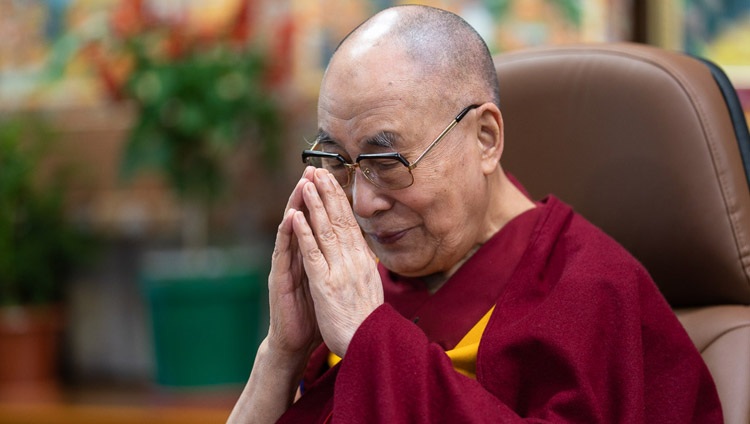
To a question about the value of forgiveness, His Holiness stated that forgiveness is one of the best ways to keep your peace of mind. Anger and a wish for revenge, he added, only serve to disturb your sleep.
“My third commitment,” His Holiness continued, “relates to my being Tibetan. Since we have a healthy democratic system, I’ve been able to retire from political responsibility. However, I’m concerned about Tibet’s ecology because the majority of Asia’s rivers rise on the Tibetan plateau, supplying water to many millions of people.”
Derbez took up the ecological theme to ask how it is that, in the face of extreme events like the wildfires in California and unprecedented hurricanes as a result of global warming, so many global leaders ignore the threat of climate change.
“Our eco-systems are telling us we have to take care of this planet,” His Holiness replied. “Climate change is bringing about disastrous fires and floods that are beyond our control. It is very serious.
“There was one Chinese Prime Minister who visited Tibet and acknowledged that deforestation there had resulted in devastating, but avoidable, flooding down river.
“As a Tibetan I am also committed to preserving Tibetan knowledge and the Tibetan language in which it is most accurately expressed. We are the heirs of the Nalanda Tradition.
“I also have a commitment to try to revive appreciation of ancient Indian knowledge in India. Although this was recorded in religious texts, today I believe it can be studied in an objective, academic way. Especially important are the notions of non-violence and compassion.”
Finally, Derbez wanted to know if there will be a fifteenth Dalai Lama and whether that person could be a woman. His Holiness responded that any future Dalai Lama will no longer exercise any political responsibility. He added that the decision to recognise a future Dalai Lama will rest in the hands of the spiritual leaders of Tibet, the Himalayan region and Mongolia.
As to whether a future Dalai Lama could be a woman, he confirmed that if that would be more useful, it was quite possible. He observed that if more world leaders were women, there might be many fewer problems and the world might be a more stable place. He mentioned recently having written to congratulate the Finnish Prime Minister on forming a cabinet with women in the key positions. He reiterated that a future female Dalai Lama seems quite possible.
Derbez thanked His Holiness for taking time to talk to him and invited him to watch a short video summarizing his visit to Mexico in 2013. At the end, His Holiness smiled, waved, thanked Derbez and wished him goodbye.
SOURCE: dalailama.com





